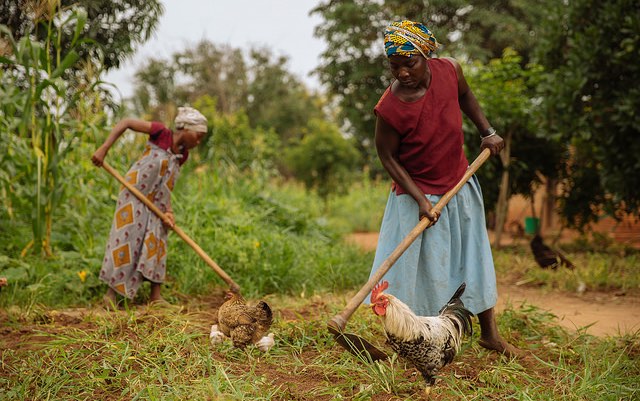Agriculture is key to improving food security and reducing poverty in Africa. Studies have shown that agriculture-driven growth on the continent contributes more to poverty reduction than growth driven by other sectors. Agriculture is a major source of income for most of the rural population of Africa South of the Sahara and accounts for more than half of total employment. But for many reasons, the great potential for African agriculture has yet to be realized. The continent has around 930 million hectares of land suitable for agricultural production—an area greater than that of the entire United States—yet more than half remains relatively inaccessible to good roads and markets.
One emerging catalyst for change is China. As the country has become a strong player in international development assistance, its work on agricultural modernization in Africa has attracted increasing attention. A new IFPRI report examines the promise of this partnership, exploring its history and scope, and outlines policies to develop an integrated action plan to promote China-Africa cooperation to modernize African agriculture.
The problems Africa faces are serious. While agricultural output has grown steadily in the past two decades, agricultural productivity remains low compared to other developing countries and regions: Crop yield per hectare is less than half of the world average. The sector faces many obstacles, including unfavorable land property rights policies; poor agricultural infrastructure; insufficient public investment in agricultural R&D; a lack of regional market integration; an underdeveloped private sector; ongoing impacts from international food price volatility and climate change; and persistent political instability and conflicts.
African countries need international funding, technology, and knowledge to overcome these problems and boost productivity. But foreign investors have long neglected African agriculture, and assistance from traditional donor countries is chronically insufficient. Hence the opening for a committed player such as China.
China and Africa have collaborated on agriculture for 60 years. China began by providing grants and loans, then cooperation gradually expanded to a wide range of activities, including trade and investment. Recently, China has doubled down on its Africa investments.
At the 2015 Johannesburg Summit of the China-Africa Cooperation Forum (FOCAC) , President Xi Jinping announced ten major cooperation plans, including agricultural modernization, and promised a total of $60 billion in funding support. At the 2018 Beijing FOCAC Summit, Xi pledged another $60 billion to support eight major initiatives in China-Africa cooperation—including a proposal to work with the African Union and IFPRI to develop and implement a program of action to promote Africa’s agricultural modernization. Meanwhile, the Belt and Road Initiative, of which African countries are key partners, stresses international agricultural cooperation as one of the key areas for building a community of shared future for mankind.
At present, these efforts focus on funding agricultural cooperation programs, establishing agricultural technology demonstration centers, dispatching experts, and carrying out capacity building activities. In addition, agricultural trade between China and Africa has grown rapidly—total trade volume increased from $609 million in 2001 to $5.41 billion in 2016—an average annual growth rate of 15.7 percent. China has also boosted its direct investment in Africa’s agricultural sector, and the Chinese private sector has begun to play an increasing role.
The partnership faces a number of obstacles, the report says, including a lack of comprehensive strategic planning and overall coordination; language and cultural barriers; and skeptical and even accusatory voices from the international news media.
To support the creation of the integrated action plan to guide China-Africa cooperation on agricultural modernization the next ten years, the report provides a set of policy recommendations:
- Policy research and strategic planning based on effective policy dialogue should be given the top priority.
- Work to link planning efforts with key agriculture development frameworks: The African Union Business Plan for the Implementation of the CAADP–Malabo Declaration 2017–2021 .
- Identify priority investment areas based on local needs.
- Promote knowledge sharing of China’s development lessons based on sound evidence and research and adapt these lessons to African communities.
- Improve commercial operation in the agricultural sector through strengthened participation of the private sector for better sustainability.
- Strengthen three-way cooperation between Africa, China, and partners including international organizations, bilateral development agencies, civil society, and the private sector.
- Encourage independent impact evaluations of China-Africa agricultural projects and partner with the media to communicate evidence-based stories.
As China ramps up its Africa investments, these recommendations can help to unleash African countries’ potential in agricultural development, strengthen and broaden the cooperation between China and Africa, and begin to effectively align China’s agricultural development assistance plan with Africa’s own agricultural development plans and policies.
Xinyuan Shang is an IFPRI Senior Communications Specialist based in Washington, D.C. Liwen Zhang is an IFPRI Communications Assistant based in Beijing.
The technical report China-Africa Agricultural Modernization Cooperation: Situation, Challenges, and the Path Ahead was authored by Kevin Chen, Senior Research Fellow, IFPRI; Ousmane Badiane, Director for Africa, IFPRI; Liwen Zhang, Communications Assistant, IFPRI; Julia Collins, Research Analyst, IFPRI; and Yunyi Zhou, Research Assistant, IFPRI. The authors acknowledge financial support from the Bill & Melinda Gates Foundation.







